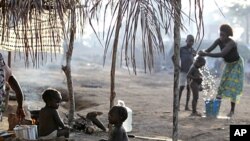Refugees from this year's political crisis in Ivory Coast say it is not yet safe enough to return home. Ivory Coast's new national army and U.N. peacekeepers are increasing security along the borders after a series of attacks.
The U.N. refugee agency is helping more than 18,000 Ivorians in neighboring Ghana. They crossed the border because they fear reprisal attacks by supporters of Ivorian President Alassane Ouattara. Most of the refugees are ethnic Guere. And most of the Guere backed Ouattara's rival, the former Ivorian president Laurent Gbabgo.
With Ouattara fighters now part of the new national security force, refugee Boho Manayu Moutine says she is too afraid to go back.
Moutine says she lost everything. Her husband, her brother, and her children were all killed. Because she lost everything, Moutine says there is no reason to go back.
Many of the Ivorian refugees in Ghana, Guinea, Togo and Liberia say they have no intention of returning home soon. So relief officials are building more permanent sites. The U.N. coordinator for Ghana, Rudy Sandhu, says that has left a $70 million shortfall in donor funds to support Ivorian refugees in the region.
"We've used the resources that we got within the country programs, and we've tried to get funding from our headquarters, but the issue now is that since it is no longer an emergency it's becoming a lot more difficult for us," said Sandhu.
U.N. peacekeepers in Ivory Coast and in Liberia are stepping up patrols along the border following last week's death of 23 people in an attack that Ivory Coast's defense ministry says was carried out by “Liberian mercenaries.”
The Economic Community of West African States (ECOWAS) says it is concerned about the upsurge in violence, especially as Liberia prepares for a presidential election next month while still hosting more than 170,000 Ivorian refugees.
The president of the regional alliance, James Gbeho, says ECOWAS leaders are calling on all Liberian politicians to work toward a free and fair vote so as not enflame tensions that could break out along the border.
"It appealed to all the stakeholders in Liberia to cooperate in achieving this objective by putting the interest of Liberia above sectional considerations," said Gbeho.
The head of the U.N. mission in Liberia, Margarethe Loj, says she will need U.N. troops from Ivory Coast to reinforce peacekeepers in Liberia during the vote.
Liberian President Ellen Johnson Sirleaf says those additional U.N. troops will join a special Liberian police force to prevent violence during the poll. That has led to criticism from some of her challengers that she is trying to intimidate opposition voters and has not properly budgeted for increased security along the 700-kilometer border.
"If you are bringing additional troops for whatever the executive deems fit, there are financial implications," said Jewel Howard-Taylor, a senator from Liberia's Bong County. "Who is going to pay for the extra burden? The legislature needs to know what the extra price tag is especially as we consider the fact that we have by-elections that might or may be 30 percent or 40 percent of those who will be running in this elections. There is a huge outcry now for additional funding."
The southern border between Ivory Coast and Liberia is an especially troubled region with long-standing ethnic rivalries that played out in both the Liberian civil war and the political crisis that followed Ivory Coast's disputed presidential election.
Human rights groups say much of the violence during that crisis was carried out by northern militia who were backing President Ouattara. He has ordered a full investigation into all post-election violence as part of a reconciliation process that he hopes will encourage more refugees to return home.















